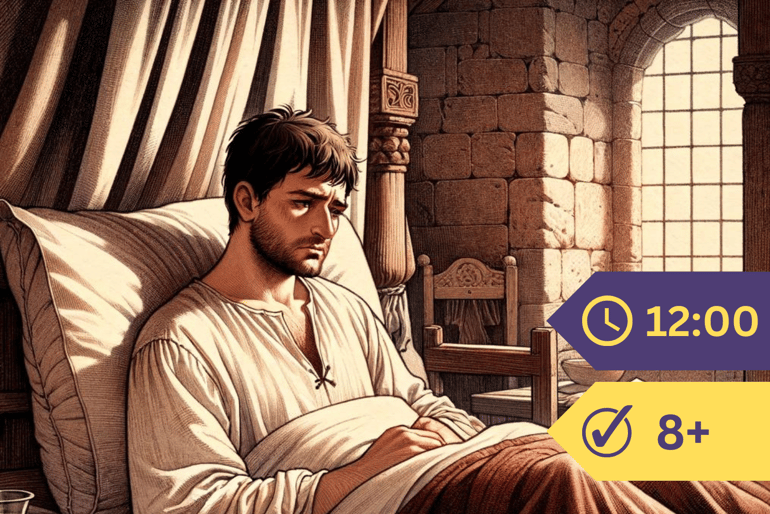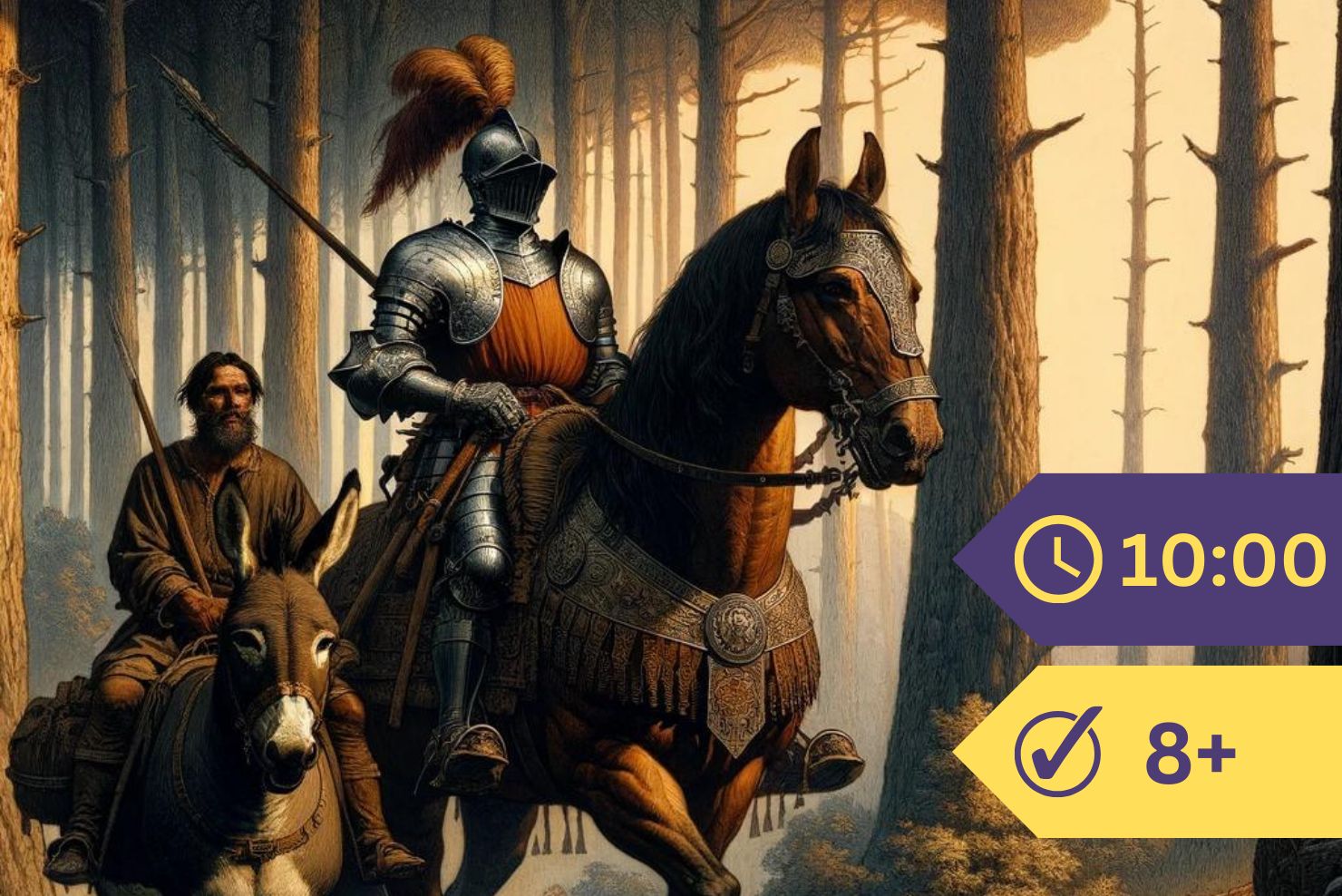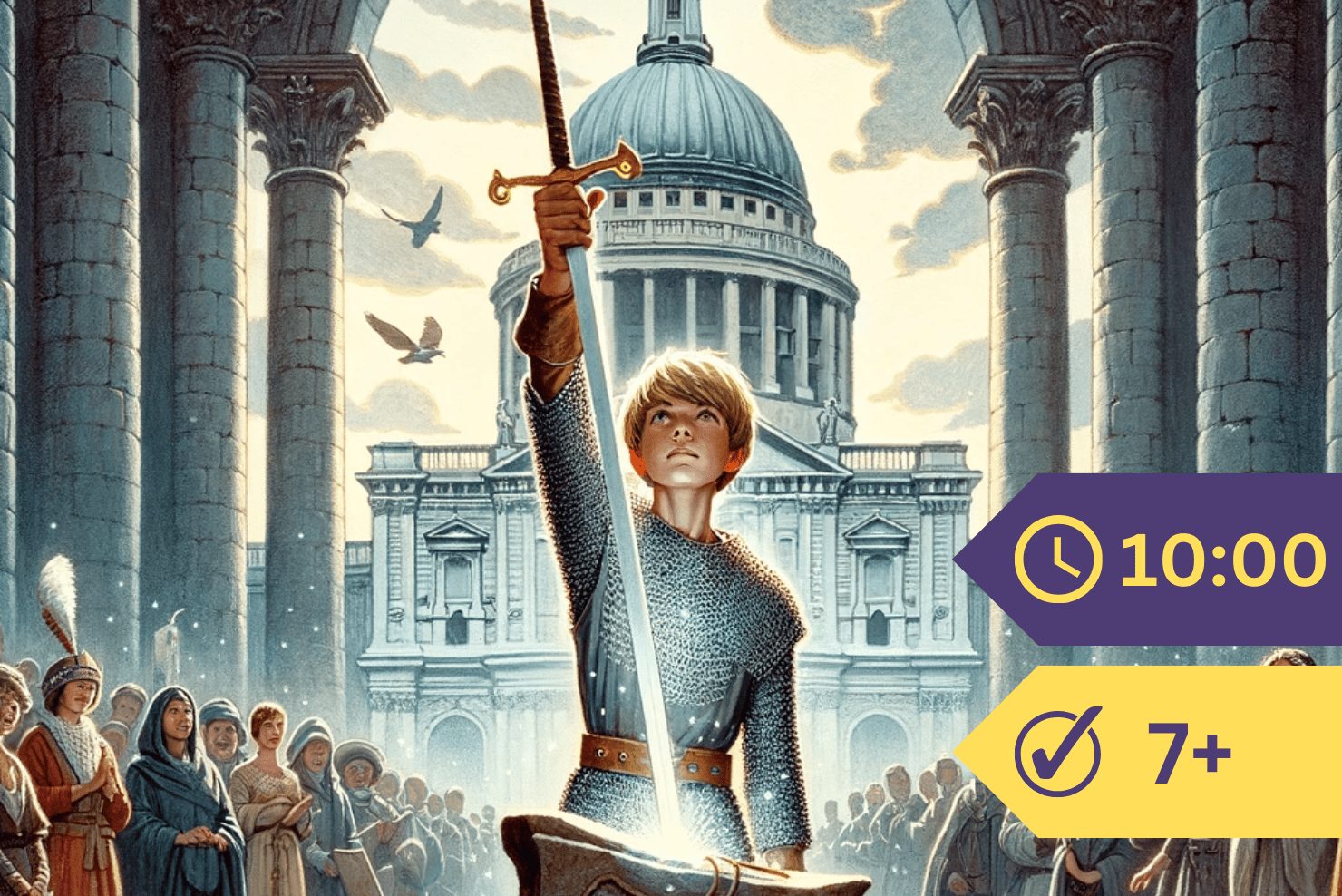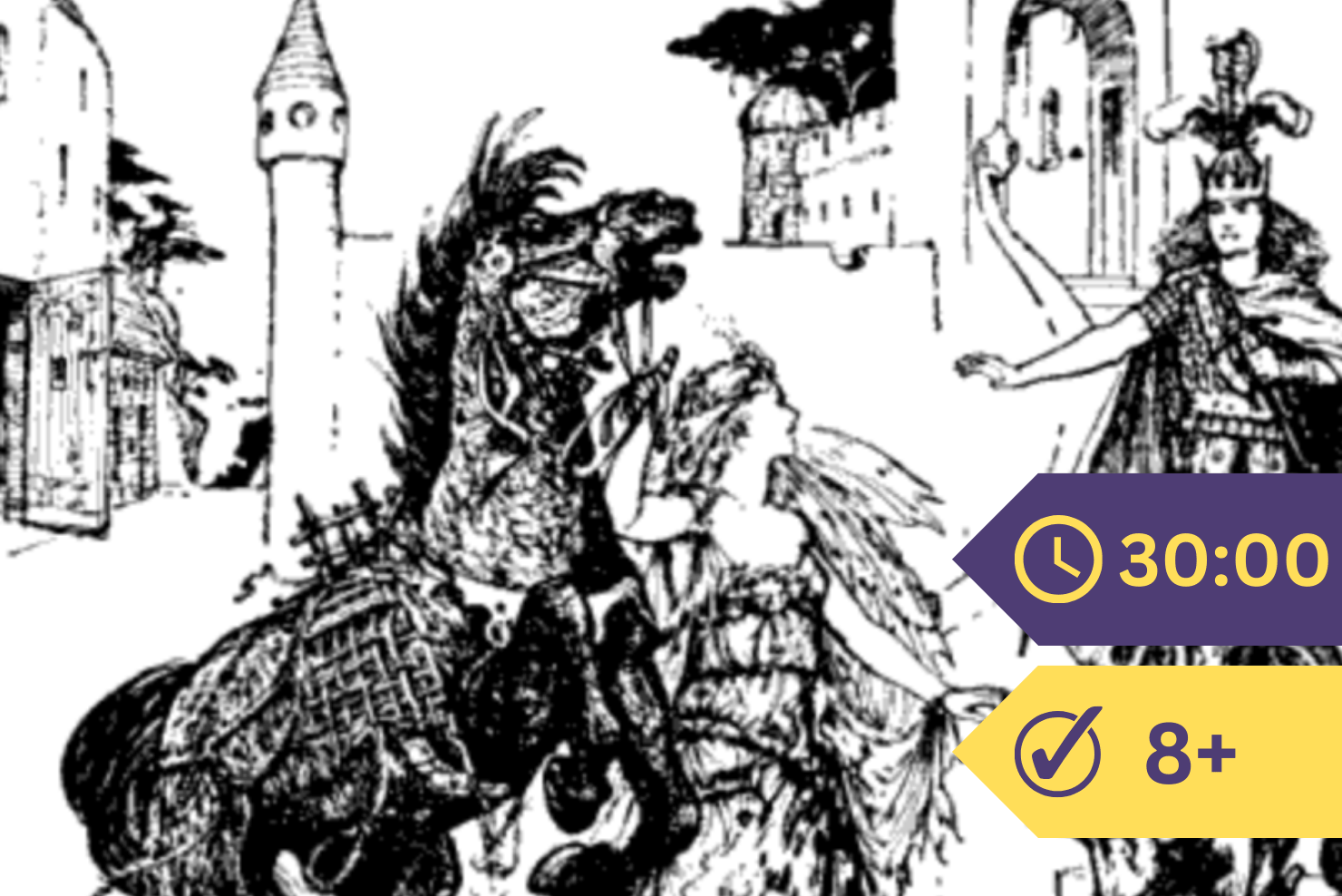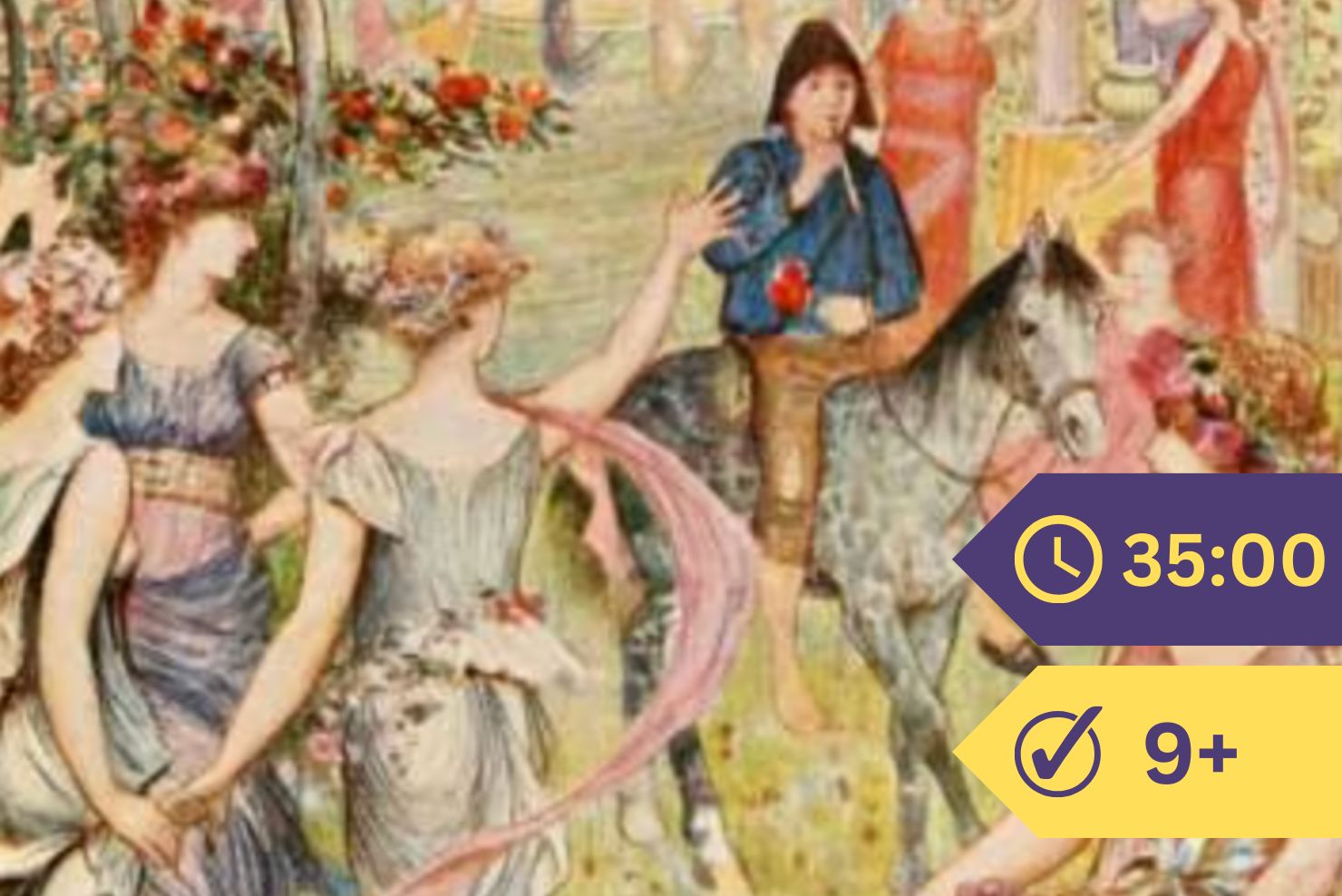For some time after the Yanguesian carriers had gone on their way Don Quixote and Sancho Panza lay on the ground groaning and saying nothing.
The first that came to himself was Sancho Panza, who cried in a weak and pitiful voice: “Sir Don Quixote! O Sir Don Quixote!”
“What wouldst thou, brother Sancho?” answered Don Quixote in the same faint and grievous tone as Sancho.
“I would, if it were possible,” said Sancho Panza, “that your worship should give me a couple of mouthfuls of that balsam of Fierabras, if so be that your worship has it at hand. Perhaps it will be as good for broken bones as for wounds.”
“If I had it here,” sighed Don Quixote, “we should lack nothing. But I swear to thee, Sancho Panza, on the faith of a knight-errant, that before two days pass, unless fortune forbids, I will have it in my possession.”
“I pray you,” asked Sancho, “in how many days do you think we shall be able to move our feet?”
“I cannot say,” said the battered knight; “but I take on myself the blame of all, for I should not have drawn my sword against men that are not knights. Therefore, brother Sancho, take heed of what I tell thee, for it mightily concerns the welfare of us both; and it is this, that when thou seest such rabble offer us any wrong, wait not for me to draw sword upon them, for I will not do it in any wise, but put thou thy hand to thy sword and chastise them at thy pleasure.”
But Sancho Panza did not much relish his master’s advice, and replied: “Sir, I am a peaceable, sober, and quiet man, and can let pass any injury whatever, for I have a wife and children to take care of. Therefore, let me also say a word to your worship, that by no manner of means shall I put hand to sword either against clown or against knight. And from this time forth I forgive whatever insults are paid to me, whether they are or shall be paid by persons high or low, rich or poor, gentle or simple.”
On hearing this his master said: “Would that I had breath enough to be able to speak easily, and that the pain I feel in this rib were less, that I, might make thee understand, Sancho, the mistake thou art making! How can I appoint thee governor of an island when thou wouldst make an end of all by having neither valour nor will to defend thy lands or revenge thine injuries?”
“Alas!” groaned Sancho. “I would that I had the courage and understanding of which your worship speaks, but in truth at this moment I am more fit for plasters than preachments. See if your worship can rise, and we will help Rozinante, although he deserves it not, for he was the chief cause of all this mauling.”
“Fortune always leaves one door open in disasters, and your Dapple will now be able to supply the want of Rozinante and carry me hence to some castle where I may be healed of my wounds. Nor shall I esteem such riding a dishonour, for I remember to have read that old Silenus, tutor and guide of the merry god of Laughter, when he entered the city of a hundred gates, rode very pleasantly, mounted on a handsome ass.”
“That may be,” replied Sancho, “but there is a difference between riding a-horseback and being laid athwart like a sack of rubbish.”
“Have done with your replies,” exclaimed Don Quixote, “and rise as well as thou art able and sit me on top of thine ass, and let us depart hence before the night comes and overtakes us in this wilderness.”
Then Sancho, with thirty groans and sixty sighs and a hundred and twenty curses, lifted up Rozinante—who if he had had a tongue would have complained louder than Sancho himself—and after much trouble set Don Quixote on the ass. Then tying Rozinante to his tail, he led the ass by the halter, and proceeded as best he could to where the highroad seemed to lie.
And Fortune, which had guided their affairs from good to better, led him on to a road on which, he spied an inn, which to his annoyance and Don Quixote’s joy must needs be a castle. Sancho protested that it was an inn, and his master that it was a castle; and their dispute lasted so long that they had time to arrive there before it was finished; and into this inn or castle Sancho entered without more parley with all his team.
The innkeeper, seeing Don Quixote laid athwart of the ass, asked Sancho what ailed him. Sancho answered that it was nothing, only that he had fallen down from a rock, and had bruised his ribs somewhat. The innkeeper’s wife was by nature charitable, and she felt for the sufferings of others, so she hastened at once to attend to Don Quixote, and made her daughter, a comely young maiden, help her in taking care of her guest. There was also serving in the inn an Asturian woman, broad-cheeked, flat-pated, with a snub nose, blind of one eye and the other not very sound. This young woman, who was called Maritornes, assisted the daughter, and the two made up a bed for Don Quixote in a garret which had served for many years as a straw-loft. The bed on which they placed him was made of four roughly planed boards on two unequal trestles; a mattress which, in thinness, might have been a quilt, so full of pellets that if they had not through the holes shown themselves to be wool, they would to the touch seem to be pebbles. There was a pair of sheets made of target leather; and as for the coverlet, if any one had chosen to count the threads of it he could not have missed one in the reckoning.
On this miserable bed did Don Quixote lie, and presently the hostess and her daughter plastered him over from head to foot, Maritornes holding the candle for them.
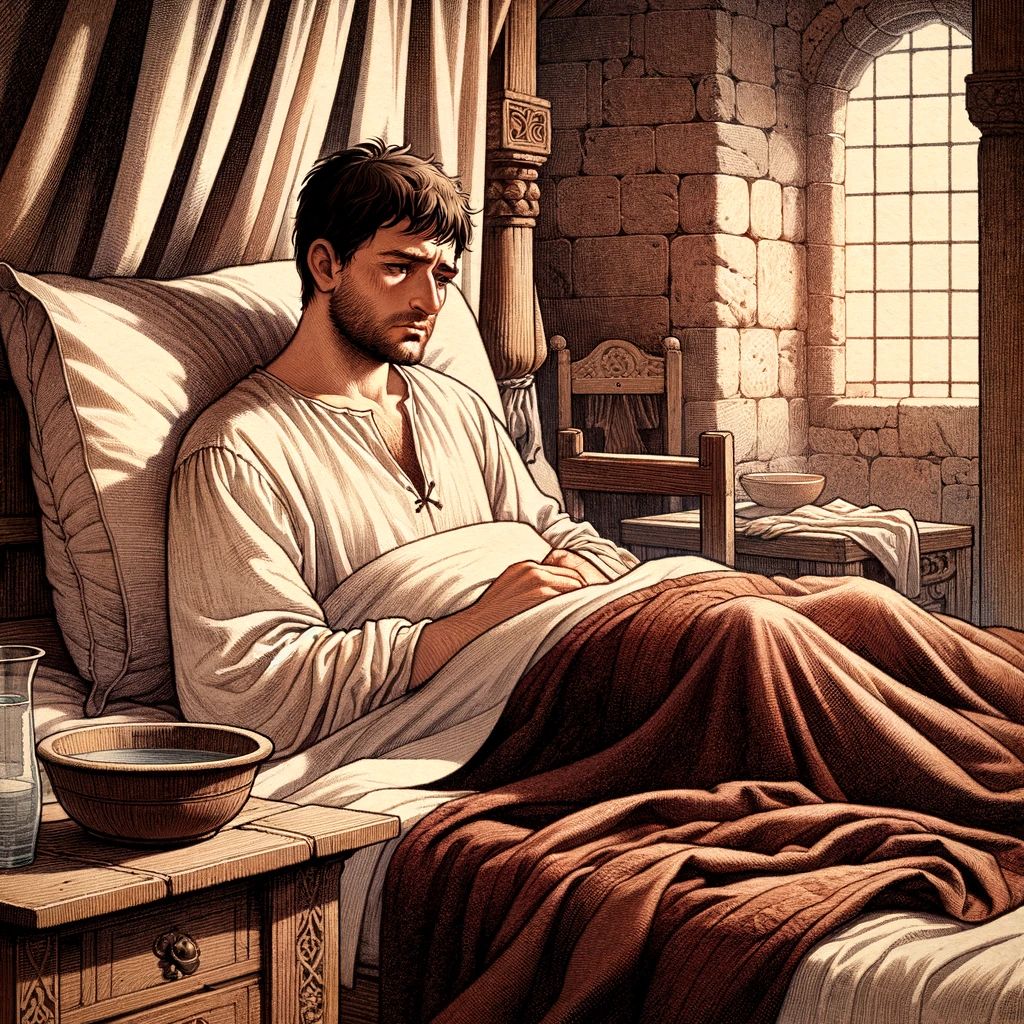
While she was plastering him, the hostess, seeing that he was in places black and blue, said that it looked more like blows than a fall. Sancho, however, declared they were not blows, but that the rock had many sharp points, and each one had left a mark; and he added: “Pray, good mistress, spare some of that tow, as my back pains are not a little.”
“In that case,” said the hostess, “you must have fallen, too.”
“I did not fall,” said Sancho Panza, “but with the sudden fright I took on seeing my master fall, my body aches as if they had given me a thousand blows, and I now find myself with only a few bruises less than my master, Don Quixote.”
“What is this gentleman’s name?” asked Maritornes.
“Don Quixote of the Mancha,” answered Sancho Panza; “and he is a knight-errant, and one of the best and strongest that have been seen in the world these many ages.”
“What is a knight-errant?” asked the young woman.
“Art thou so young in the world that thou knowest it not?” answered Sancho Panza. “Know then, sister mine, that a knight-errant is a thing which in two words is found cudgelled and an emperor. To-day he is the most miserable creature in the world, and the most needy; to-morrow he will have two or three crowns of kingdoms to give to his squire.”
“How is it, then,” said the hostess, “that thou hast not gotten at least an earldom, seeing thou art squire to this good knight?”
“It is early yet,” replied Sancho, “for it is but a month since we set out on our adventures. But believe me, if my master, Don Quixote, gets well of his wounds—or his fall, I should say—I would not sell my hopes for the best title in Spain.”
To all this Don Quixote listened very attentively, and sitting up in his bed as well as he could, he took the hostess’s hand and said: “Believe me, beautiful lady, that you may count yourself fortunate in having entertained me in this your castle. My squire will inform you who I am, for self-praise is no recommendation; only this I say, that I will keep eternally written in memory the service you have done to me, and I will be grateful to you as long as my life shall endure.”
The hostess, her daughter, and the good Maritomes remained confounded on hearing the words of the knight-errant, which they understood as well as if he had spoken in Greek, but yet they believed they were words of compliment, and so they thanked him for his courtesy and departed, leaving Sancho and his master for the night.
There happened to be lodging in the inn that night one of the officers of the Holy Brotherhood of Toledo, whose duty it was to travel the roads and inquire into cases of highway robbery. He hearing some time later that a man was lying in the house sorely wounded must needs go and make an examination of the matter. He therefore lighted his lamp and made his way to Don Quixote’s garret.
As soon as Sancho Panza saw him enter arrayed in a shirt and a nightcap with the lamp in his hand, which showed him to be a very ugly man, he asked his master: “Will this by chance be some wizard Moor come to torment us?”
“A wizard it cannot be,” said Don Quixote, “for those under enchantment never let themselves be seen.”
The officer could make nothing of their talk, and came up to Don Quixote, who lay face upwards encased in his plasters. “Well,” said the officer roughly, “how goes it, my good fellow?”
“I would speak more politely if I were you,” answered Don Quixote. “Is it the custom in this country, lout, to speak in that way to a knight-errant?”
The officer, finding himself thus rudely addressed, could not endure it, and, lifting up the lamp, oil and all, gave Don Quixote such a blow on the head with it that he broke his lamp in one or two places, and, leaving all in darkness, left the room.
“Ah!” groaned Sancho, “this is indeed the wizard Moor, and he must be keeping his treasures for others, and for us nothing but blows.”
“It is ever so,” replied Don Quixote; “and we must take no notice of these things of enchantment, nor must we be angry or vexed with them, for since they are invisible, there is no one on whom to take vengeance. Rise, Sancho, if thou canst, and call the constable of this fortress, and try to get him to give me a little wine, oil, salt, and rosemary to prepare the health-giving balsam, of which I have grievous need, for there comes much blood from the wound which the phantom hath given me.”
Sancho arose, not without aching bones, and crept in the dark to where the innkeeper was, and said to him: “My lord constable, do us the favour and courtesy to give me a little rosemary, oil, wine, and salt to cure one of the best knights-errant in the world, who lies yonder in bed sorely wounded at the hands of a Moorish enchanter.” When the innkeeper heard this he took Sancho Panza for a man out of his wits, but nevertheless gave him what he wanted, and Sancho carried it to Don Quixote. His master was lying with his hands to his head, groaning with pain from the blows of the lamp, which, however, had only raised two big lumps; what he thought was blood being only the perspiration running down his face.
He now took the things Sancho had brought, of which he made a compound, mixing them together and boiling them a good while until they came to perfection.
Then he asked for a bottle into which to pour this precious liquor, but as there was not one to be had in the inn, he decided to pour it into a tin oil-vessel which the innkeeper had given him.
This being done, he at once made an experiment on himself of the virtue of this precious balsam, as he imagined it to be, and drank off a whole quart of what was left in the boiling-pot.
The only result of this was that it made him very sick indeed, as well it might, and, what with the sickness and the bruising and the weariness of body, he fell fast asleep for several hours, and at the end of his sleep awoke so refreshed and so much the better of his bruises that he took himself to be cured and verily believed he had hit upon the balsam of Fierabras.
Sancho Panza, to whom his master’s recovery seemed little short of a miracle, begged that he might have what was left in the boiling-pot, which was no small quantity. Don Quixote consenting, he took the pot in both hands, and tossed it down, swallowing very little less than his master had done.
It happened, however, that Sancho’s stomach was not so delicate as his master’s and he suffered such terrible pains and misery before he was sick that he thought his last hour was come, and cursed the balsam and the thief who had given it to him.
Don Quixote, seeing him in this bad way, said: “I believe, Sancho, that all this evil befalleth thee because thou art not dubbed knight, for I am persuaded that this balsam may not benefit any one that is not.”
“If your worship knew that,” replied poor Sancho “bad luck to me and mine, why did you let me taste it?”
Before Don Quixote could reply to this, Sancho became so terribly sick that he could only lie groaning and moaning for two hours, at the end of which he felt so shaken and shattered that he could scarcely stand, and sadly wished that he had never become squire to a knight-errant.

